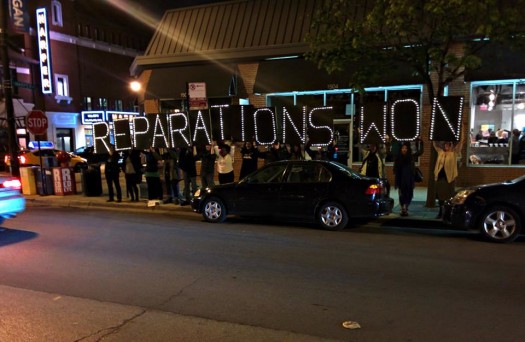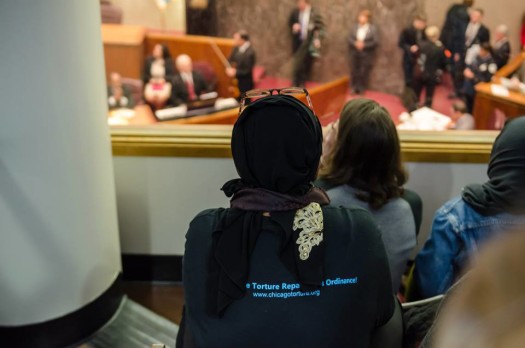The following is a post written by my friend and comrade Alice Kim. It is re-published from her blog “Dancing the Dialectic.”
Earlier this week at the last mayoral debate in Chicago’s unprecedented run-off election, the scene outside WTTW Studio was a strange mix of about 75 Rahm supporters from Local 73, mostly middle-aged white men some wearing hard hats, carrying their shiny blue “I’m for Rahm” placards, a larger group of residents from the northwest side of Chicago protesting airport noise, and then there was us.
We were a small, some would say rag tag, group of about a dozen activists armed with a beautiful “Reparations Now” banner made by local artists and a sound system. Among us were queer activists, long-time prison abolitionists, torture survivors, and an NEIU student who learned about the protest from one of his teachers. Thanks to the power of amplification and to the chagrin of the pro-Rahm contingent, we were able to drown out their “Four More Years” chants with “Mr. Mayor if you care, we want reparations, fair and square” – a chant we had repurposed from our friends demanding noise-free air.
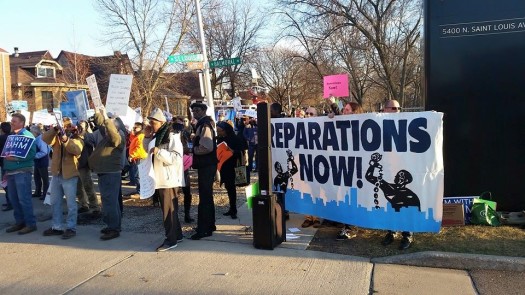
photo by Andy Thayer (3/31/15)
No fans of Rahm were in our group, but our purpose at the debate was not to support one candidate over another. Since attendance inside WTTW was by invitation only (and none of us had been invited), we gathered outside waiting for the candidates to arrive. Flanked by union Rahm guys and angry homeowners fed up with airport noise, we had a very specific message for the candidates: reparations for Chicago Police torture survivors.
The story of former Chicago Police Commander Jon Burge and his torture practices is chilling: Burge and his detectives tortured 119 African American men and women in their custody using torture tactics ranging from electric shock and suffocation with a typewriter bag to mock executions. These brutal interrogations elicited confessions that were often the primary evidence that was used to convict these defendants. For decades, activists have organized to expose these torture practices; hold the officers responsible accountable; and seek justice for the survivors of torture.
In 2010, 17 years after Burge was fired from the Chicago Police Department, he was found guilty of obstruction of justice and lying about the torture and subsequently sentenced to four and a half years in prison. Yet, justice remained elusive for Burge’s victims who continued to suffer from the trauma of the torture they endured. Over a year and a half ago, the Chicago Torture Justice Memorials worked with Aldermen Joe Moreno and Howard Brookins to introduce the Reparations Ordinance in City Council as a means of offering holistic redress to Burge torture survivors. With this ordinance, we tried to articulate a more meaningful vision of justice by not only seeking financial restitution for the survivors but also a trauma center on the South Side of Chicago that offers counseling and job training for all those who have faced police violence; curriculum in Chicago Public Schools that teaches about Burge torture; free education in the city colleges; a public memorial; and an official apology by the City.
To date, 29 Aldermen, more than half the City Council, have signed on in support of the ordinance. Yet, until recently, the ordinance remained stalled in the Finance Committee without a hearing despite growing support. Finally, in the wake of renewed activism by a coalition of activists, the ordinance was granted a hearing. Dozens of supporters were present at the Finance Committee’s meeting last month when the hearing was announced. Indeed, since last October, reparations supporters of the ordinance have been a regular presence at City Hall. We have staged sing-ins and die-ins in the lobby of City Council chambers, held press conferences announcing developments in the Burge saga, delivered over 35,000 signed signatures on a petition supporting the ordinance to Mayor Rahm Emanuel, and set up pop-up memorials and exhibitions in front of the Mayor’s office.
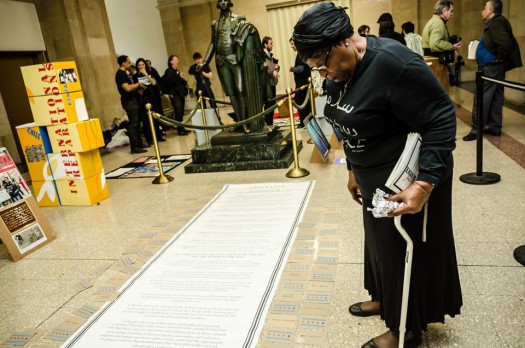
photo by Sarah Jane Rhee (3/18/15)
The reverberations of the killing of Mike Brown in Ferguson were acutely felt here in Chicago where we have been confronting our city’s own brutal history of police violence. As the mayoral election unfolded, the deafening silence of nearly all of the candidates on issues of police misconduct was not lost on those of us who had been fighting for reparations. If we wanted the candidates to address Burge torture, it would be up to us to make it so.
We called on all of the candidates to support the ordinance and invited them to publicly declare their support at a citywide rally for reparations held on Valentine’s Day, the same day that Burge was released from his prison sentence. Former contender Dock Walls was the only candidate who showed; Chuy Garcia had previously issued a statement of support after multiple appeals by reparations activists; and Bob Fioretti acknowledged his support on the day of a rally at City Hall where activists were specifically calling out Council members who did not support the ordinance. We never heard back from Willie Wilson and only heard from Emanuel via media reports where he repeatedly made evasive and non-committal statements in response to reporters’ questions about the ordinance.
Emboldened by the Black Lives Matter movement, the reparations campaign – with CTJM and our friends at Amnesty International, Project NIA, and We Charge Genocide at the helm – has taken on new life in the last few months. In addition to our visits to City Hall, we have held marches, rallies, and teach-ins in multiple neighborhoods and communities. We have used the power of social media to build public support and we have tweeted thousands of messages to the mayor. We have called, e-mailed and lobbied our City Council through good old-fashioned meetings to discuss the ordinance. We even took our message the mayor’s home one evening, spelling out “REPARATIONS NOW” in bright lights, a creative tactic organized by the Chicago Light Brigade.
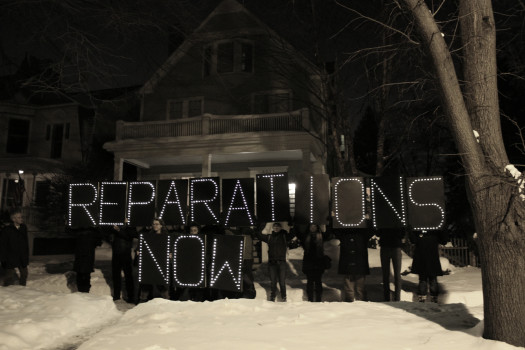
photo by Kelly Hayes (2/6/15)
From Mayor Emanuel’s doorstep to the last runoff debate, we have insisted that the Reparations Ordinance is one tangible concrete way to show that Black Lives Matter. As we prepare for a public hearing on the ordinance, I am hopeful that we will win a measure of justice for Burge survivors who have already waited too long. Come April 7, I hope we will elect a mayor who is more receptive to the needs of torture survivors and all the people of Chicago. But I know that whoever is in office, reparations activists will continue to insist that the lives of torture survivors matter.
